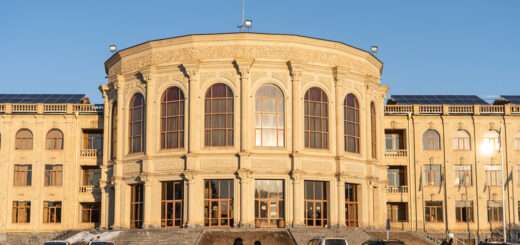Armenian bank joins race for HSBC Malta

Bank is owned by a businessman with past ties to Russia, raising reputational concerns among some insiders
Ardshinbank, a leading Armenian bank owned by an Armenian businessman with past business links to Russia, has submitted a bid for HSBC Malta, Times of Malta has learnt.
It is believed to be one of two Eastern European banks currently vying for HSBC’s Maltese operations. The identity of the other bank is not yet known.
Last November, Ardshinbank took over from HSBC in Armenia, as the global giants exited Armenia after three decades in the Armenian market.
Ardshinbank is one of Armenia’s leading banks, holding a fifth of the country’s market share. A 2024 investor briefing lists the bank as having over 400,000 customers across its 71 branches in Armenia. It registered a profit of $338m (roughly €289m) in 2024.
While the bank has been awarded a stable rating by several rating agencies, sources told Times of Malta that the bid has raised reputational concerns, particularly around the figure of its owner and his past business ties to Russia.
HSBC Malta’s eventual buyer will need to be green-lighted by HSBC’s upper echelons, as well as by the Maltese financial regulator and the European Central Bank.
Ardshinbank’s bid is unlikely to face any obstacles from HSBC’s end, given that its takeover of HSBC Armenia was only recently approved and completed. However, how regulators will respond to the bid is not yet clear.
One of the initial frontrunners in the race, OTP, backed down from the deal and declined to formally submit a bid after reputational concerns were flagged, with sources telling Times of Malta that Ardshinbank is highly likely to face similar concerns.
Who owns Ardshinbank?
Ardshinbank is owned by businessman Karen Safaryan, who founded the bank in 2003.
Safaryan owns almost all the bank’s shares through a holding company, Arins Group, of which he is the sole shareholder.
Armenian sources who spoke to Times of Malta described Safaryan as a well-connected figure who likes to keep a low profile.
After beginning his career as an engineer, the 62-year-old businessman developed several business ventures after relocating to Russia in the mid-1990s. His official biography describes him as having “dozens” of businesses across Russia and Armenia by the early 2000s.
He also held several high-ranking posts in prominent Russian companies, including Rosaviaspetskomplekt, a company specialising in aviation components, before entering the banking world and founding Ardshinbank in 2003.
In 2016, Ardshinbank merged with Areximbank, the Armenian subsidiary of Russian banking giant Gazprombank, after the subsidiary was bought by a holding company, named Region, which is also owned by Safaryan.
Safaryan is known to be close to Armenia’s current deputy prime minister Mher Grigoryan, who spent several years chairing Ardshinbank’s board, before entering politics. Armenian sources describe Grigoryan as a technocrat, a career banker who transitioned to politics as a compromise candidate following the country’s 2017 elections.
Safaryan is also believed to have personal ties to former Armenia PM Karen Karapetyan.
Business links
Safaryan’s political connections, together with certain negative media reports about his past business dealings, are believed to have raised reputational concerns among insiders involved in the HSBC Malta sale, according to sources close to the deal.
One independent regional media outlet described Safaryan as a “murky Russian aerospace mogul”, while another lists him as a hidden beneficiary of Aviaprom, an aviation company that has since been blacklisted after defaulting on government contracts.
Meanwhile, some business reports at the time of the merger with Gazprombank suggested that the deal might help evade Western sanctions.
At the time, Gazprombank faced an early batch of EU sanctions following Russia’s annexation of Crimea, effectively limiting the bank’s access to EU markets.
Several years later, Gazprombank would be hit with harsher US sanctions, having its assets frozen and prohibiting dealings with the Western world altogether in 2024.
However, others have pointed to different reasons behind the merger, most notably a change to Armenian banking requirements at the time which prohibited banks from having less than 30 billion Armenian dram (€67m) in capital, effectively forcing several smaller banks to shut down or find new owners.
Safaryan ‘no longer active in Russia’
While these reports may have raised red flags in some banking circles, there is no evidence of Safaryan himself being directly implicated in wrongdoing.
Safaryan’s biography says he has divested all Russian business interests over the past years and, since 2019, his “business activities have been concentrated solely in Armenia, in the financial sector”.
Nevertheless, a 2020 risk profile drawn up as part of loan deal between Ardshinbank and a private investor notes that “Mr Safaryan has other business interests in Armenia, notably in the insurance and real estate sectors, as well as in Russia,” although he is believed to have continued shedding his Russian businesses over the following years.
Contacted by Times of Malta, Ardshinbank declined to comment on the bank’s interest in purchasing HSBC Malta, citing its policy not to comment on market speculation.
However, the bank has previously publicly addressed allegations of impropriety across Safaryan’s business ventures in a statement issued last year, following allegations made by Armen Chibukchyan, an Armenian blogger and former journalist.
In its statement, the bank objected to instances in which “several companies are inaccurately portrayed as under Mr Safaryan’s control, despite any links being over 30 years old, or where companies are erroneously claimed to be owned by Mr Safaryan when they have never been associated with him”.
The bank had also refuted the suggestion that Safaryan carried undue political influence, saying he “has never engaged in politics, neither in Russia nor in Armenia”.
A bank spokesperson told Times of Malta that “the claims made are defamatory and categorically false, as demonstrated by the fact that the Yerevan General Court ruled in favour of Mr Karen Safaryan in a defamation and insult case against the blogger earlier this year, with damages awarded.”





